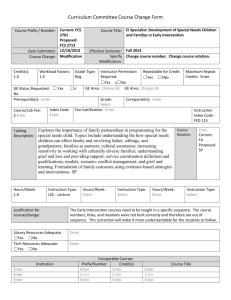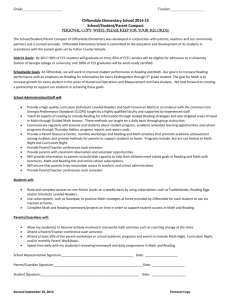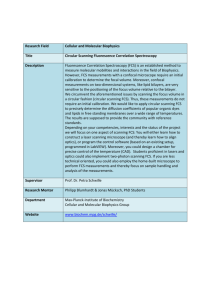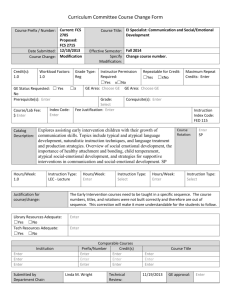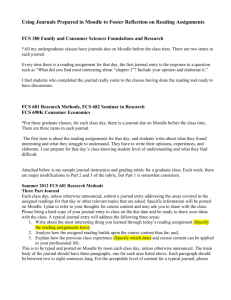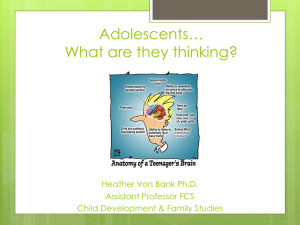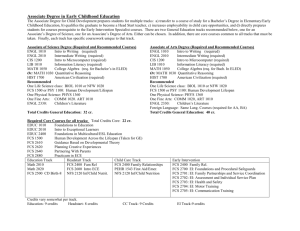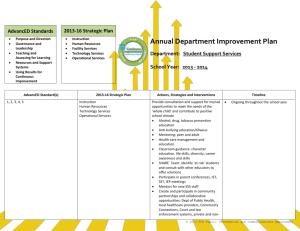Student Learning Assessment Program
advertisement
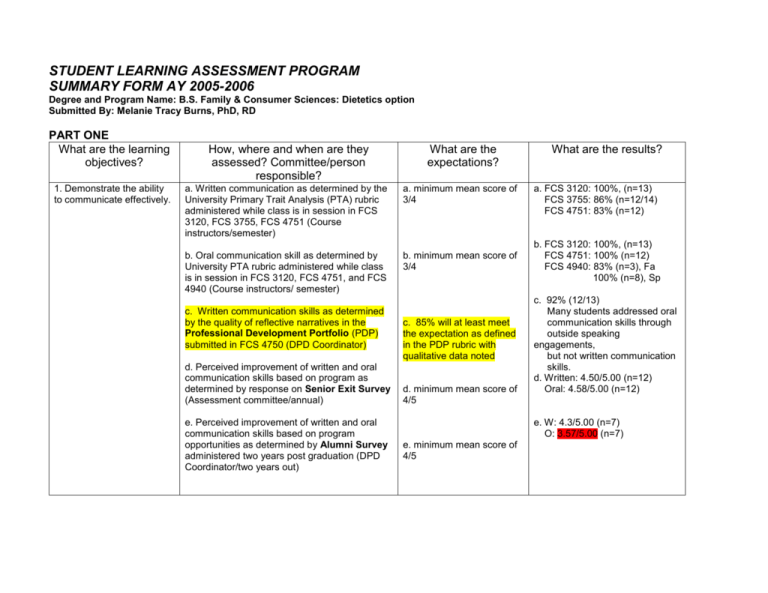
STUDENT LEARNING ASSESSMENT PROGRAM SUMMARY FORM AY 2005-2006 Degree and Program Name: B.S. Family & Consumer Sciences: Dietetics option Submitted By: Melanie Tracy Burns, PhD, RD PART ONE What are the learning objectives? 1. Demonstrate the ability to communicate effectively. How, where and when are they assessed? Committee/person responsible? What are the expectations? a. Written communication as determined by the University Primary Trait Analysis (PTA) rubric administered while class is in session in FCS 3120, FCS 3755, FCS 4751 (Course instructors/semester) a. minimum mean score of 3/4 b. Oral communication skill as determined by University PTA rubric administered while class is in session in FCS 3120, FCS 4751, and FCS 4940 (Course instructors/ semester) b. minimum mean score of 3/4 c. Written communication skills as determined by the quality of reflective narratives in the Professional Development Portfolio (PDP) submitted in FCS 4750 (DPD Coordinator) d. Perceived improvement of written and oral communication skills based on program as determined by response on Senior Exit Survey (Assessment committee/annual) e. Perceived improvement of written and oral communication skills based on program opportunities as determined by Alumni Survey administered two years post graduation (DPD Coordinator/two years out) c. 85% will at least meet the expectation as defined in the PDP rubric with qualitative data noted d. minimum mean score of 4/5 What are the results? a. FCS 3120: 100%, (n=13) FCS 3755: 86% (n=12/14) FCS 4751: 83% (n=12) b. FCS 3120: 100%, (n=13) FCS 4751: 100% (n=12) FCS 4940: 83% (n=3), Fa 100% (n=8), Sp c. 92% (12/13) Many students addressed oral communication skills through outside speaking engagements, but not written communication skills. d. Written: 4.50/5.00 (n=12) Oral: 4.58/5.00 (n=12) e. W: 4.3/5.00 (n=7) O: 3.57/5.00 (n=7) e. minimum mean score of 4/5 2. Work effectively as a dietetic professional individually and in a team environment. a. Effective as a lab partner in FCS 2140 and 3120 as determined by a holistic score (Course instructor evaluation in FCS 3120/semester, peer evaluation in FCS 2140/semester) a. 85% of students will score at least a 3/4 for participation in FCS 2140 and a 4/5 in FCS 3120 a. 2140: Fa, 100%, x= 3.3 2140: Sp 3120: 100%, (n=13) b. Participation and leadership in FCS 3151 nutrition education program as determined by a PTA rubric for effective team members (peer evaluation/semester) b. 85% of students enrolled will score at least a 20/25 for effective group work b. Fa: 100%, x=22.5 Sp: 83%, x=21.7 c. Articulate short and long term professional goals and career path alternatives in FCS 4150 (Course instructor/annual) d. Self-reflection of professional behavior, individually and in a team environment, stated in each student’s Professional Development Portfolio submitted in FCS 4750 (DPD Coordinator and FCS 4750 course instructor/Spring semester) e. Perceived ability to work effectively in a team environment and individually as determined by response on Senior Exit Survey (Assessment committee/annual) f. Perceived effectiveness as determined by response on by Alumni Survey administered two year post graduation (DPD Coordinator/ two years out) c. 100% will articulate at least 2 short and long term goals and career path in BS portfolio d. Qualitative data to reflect trends e. Minimum mean score of 4/5. c. FCS 4150: 100% d. Many perceived that their program assisted them in working effectively in a team environment. Classroom activities were not noted as frequently as extramural activities. e. 4.50/5.00 (n=12) 4.50/5.00 (n=12) f. 4.43/5.00 (n=7) f. Minimum mean score of 4/5. 5. Synthesize the role of nutrients and food in the achievement and maintenance of human health and well-being. a. Analysis of three day food record in FCS 2100 (Course instructors/semester) a. All students will score a 85% or higher. a. Fa: 88% (n=7) Sp: 2/2, 2/2, b. 2A's, 4B's, 5C's, 1D & 1F b. Final exam score in FCS 3755 (Course instructor/annual) b. range of scores to follow standard bell curve c. Macronutrient learning activity in FCS 3755 (Course instructor/annual) c. 85% will score a grade of “B” or higher. d. Performance on FCS 2100 proficiency exam as taken early in FCS 4750 d. 90% of students will score at least a 75% d. 73% (14/16) e. Final exam score in FCS 4750 (Course instructor/annual) e. 90% of students will score at least a 70% e. 94% (15/16) f. Multivitamin analysis in FCS 3755 (Course instructor/annual) f. 85% will score a grade of “B’ or higher f. 69%, n=9/13 g. Self-reflection of ability to synthesize the role of nutrients and food as stated in each student’s Professional Development Portfolio submitted in FCS 4750 (DPD Coordinator and FCS 4750 course instructor/Spring semester) g. Qualitative analysis of self reflection g. Many students had difficulty reflecting on this objective in that they didn’t have many artifacts and had a weaker reflection. c. 57% scored a B or higher h. Perceived effectiveness as determined by response on Senior Exit Survey (Assessment committee/annual) 6. Apply scientific knowledge and principles to medical nutrition therapy practices. h. minimum mean score of 4/5 i. Perceived effectiveness as determined by response on Alumni Survey administered two year post graduation (DPD Coordinator/ two years out) i. minimum mean score of 4/5 j. RD exam total score and sub-test score – collected twice annually j. Pass rate of 80% with a sub-test score matching the national average. a. Medical record charting completed in FCS 4751 (Course instructor/annual) a. 85% will have a mean score of 15/20, based on total grade, with improvements expected h. 4.33/5.00 (n=12) i. 4.28/5.00 (n=7) j. 73% pass rate (nat’l 80%) (n=11) sub test score: 14.5 (15.6 nat’l) a. 92% from the first note to the last. b. Successful completion of case studies in FCS 4751 (Course instructor/annual) c. Self-reflection of ability to apply knowledge and principles to MNT practices as stated in each student’s Professional Development Portfolio submitted in FCS 4750 (DPD Coordinator and FCS 4750 course instructor/Spring semester) d. Perceived effectiveness as determined by response on Senior Exit Survey (Assessment committee/annual) e. Perceived effectiveness as determined by response on Alumni Survey administered two year post graduation (DPD Coordinator/two years out) b. 88% b. 85% will have a mean score of 15/20, based on grade, with improvements expected from the first to the last. c. Qualitative analysis of self reflection d. Minimum mean score of 4/5. c. Many students had difficulty reflecting on this objective in that they didn’t have many artifacts and had a weaker reflection. d. 4.42/5.00 (n=12) e. 3.86/5.00 (n=7) e. Minimum mean score of 4/5. * The Didactic Program in Dietetics is granted accreditation status by the Commission on the Accreditation of Dietetics Education, 120 S Riverside Plaza, Suite 2000, Chicago, IL 60606-6995, 312/899-5400. PART TWO Plans for 2005-2006: 1. Compare student learner outcomes with the new Foundation Knowledge and Skills Statements in accordance with our accreditation status. Completed Spring 2006 with changes made to Physiological Nutrition (FCS 3755). Effective Fall 2006, FCS 3755 will have a new name, Life Cycle Nutrition to reflect its greater focus on life cycle nutrition, and the class will no longer be writing intensive. Additionally, due to changes in the School of Business, BUS 1950 will no longer be required for dietetic students as BUS 1950 is no longer a prerequisite for BUS 2100. 2. Modify process of collecting alumni data – perhaps online. All alumni data were collected via an email survey with a 50% response rate. 3. Develop ‘employer’ survey to be administered to the alumni’s first employer. Discussed the logistics in Program Area meetings. Survey is not yet developed. 4. Enhance assessment activities for Food Science (FCS 3120). The course instructor and the DPD Coordinator met on several occasions to discuss the assessment activities in FCS 3120 and to brainstorm why the students aren’t performing on assignments as they need to. Based on these discussions, several new assessment items have been included on this year’s assessment plan. Several new assignments have been added to the curriculum with substantial changes to the FCS 3120 lab manual have been identified for revision for Spring 2007. 5. Continue to improve FCS 4150 and FCS 4750 assessment activities – streamline more with FCS portfolio, if possible. The Dietetic Professional Development Portfolio process was explained in FCS 4150 in the fall with the template binder submitted for review and grade. The DPD Coordinator spoke with the students in Advanced Human Nutrition (FCS 4750) in the spring with the first PDP due in April. The FCS 4750 course instructor and the DPD Coordinator reviewed the submissions noting qualitative data. Submitting with the FCS portfolio is not feasible, however, the template that the students use for the FCS portfolio is followed for the PDP. 6. Plan quantity foods lab for KH 1411, secure funding for, and remodel lab to provide more/better experiences for students. During AY 05-06, Dr. Rick Wilkinson and Dr. Melanie Burns drafted the layout for the “Klehm Hall Café” to be located in KH 1411. An equipment list and the overall Concept Statement, complete with the project broken down into phases, were developed. A list of donors was drafted with initial contacts made to many of the possibilities. Status to date on the remodeling includes the cost of the total project has been determined, all unnecessary items have been removed from KH 1411 (phase 1), and the remodeling of the kitchenette in KH 1418 (phase 3) is almost completed. Plans for 2006-2007: 1. Draft self-study and participate in the site visit. 2. Put the alumni survey online. 3. Develop an online ‘employer’ survey to be administered to the alumni’s first employer. 4. Modify rubric to assess the content of the Professional Development Portfolio. 5. Continue to move towards the completion of the “Klehm Hall Café”. PART THREE 1. Changes in assessment plan items (not including the results) are highlighted in yellow. 2. Results that did not meet the expectation are highlighted in red. 3. The first submission of the Professional Development Portfolio was successful. A blank template was submitted in a required course (FCS 4150) in the fall. The contents and process of the submission of the complete portfolio was discussed by the DPD Coordinator who is also the instructor of the course. All of this information is online. The DPD Coordinator also spoke to the students in the spring enrolled in FCS 4750 to discuss the process once more. Based on the quality of the portfolios, which were well done, more guidance from the DPD Coordinator on which materials to add to the portfolio might be helpful, but then, we could lose the piece of the assessment where the student determines how each objective was achieved. The DPD Coordinator did note that three content-based objectives (4-6) were the weakest in terms of number and quality of artifacts. 4. Overall, assessment is embraced by the dietetics faculty. Obtaining the information from the faculty was not troublesome, and discussions during our program area meetings regarding assessment are productive.
